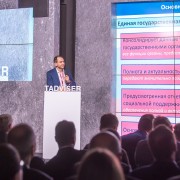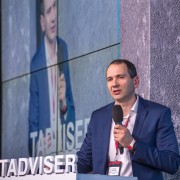Sklyar Aleksei Valentinovich
Central Federal District of the Russian Federation
Moscow
Information Technology
BI
Big Data
25.04.1975
Co-founder
Previous jobs:
Russian Export Center (REC)
Vice president
Ministry of Labor and Social Protection of the Russian Federation (Ministry of Labor of Russia)
Deputy Minister
Accounts Chamber of the Russian Federation
Chief information officer
Federal Treasury of the Ministry of Finance of the Russian Federation
Content |
Biography
Born April 25, 1975 in the city of Slavyansk, Krasnodar Territory.
In 1997 he graduated from Kuban State University with a degree in accounting and audit. In 2003, he underwent professional retraining at the RAGS under the President of the Russian Federation under the program "Financial, credit and tax policy of the state." Candidate of Economic Sciences.
He began his career in January 1995 as the head of the department of investment programs and integrated development of the Investment Fund for the Development and Renewal of the Kuban.
From July 1997 to January 2002, he went from a leading specialist in the department of economics, finance and accounting to Deputy General Director of OJSC Krasnodaragropromsnab Company.
2002-2013: Work in the Federal Treasury
In January 2002, Alexey Sklyar was appointed deputy head of the Federal Treasury Office for the Krasnodar Territory.
From October 20, 2008 to April 2009, he served as Deputy Head of the Department of Information Systems of the Federal Treasury of the Russian Federation.
On April 29, 2009, he was appointed deputy head of the Federal Treasury Department for the Krasnodar Territory, and on October 27, 2010 he headed the Krasnodar Department.
He was relieved of his post in November 2013.
With the participation and under the leadership of Sklyar, the Krasnodar department provided a full-scale transfer to the electronic document management system, created an interregional information protection center, deployed and introduced an audio-video conference system with all territorial management departments.
2013-2018: Work in the Accounts Chamber
Since November 2013, Alexey Sklyar worked as Director of the Information Automation Department of the Accounts Chamber of the Russian Federation. In February 2018, he headed the updated department of information and communication technologies and analytical support for the implementation of external state audit (control).
Among the key results of Sklyar's activities in the Accounts Chamber, one can single out the development and implementation of an information and analytical system for remote external state audit.
Thanks to this system, the Accounts Chamber was able to significantly increase the number of violations identified: in 2017, 6517 violations in the amount of 1.881 trillion rubles, compared to 3855 violations in the amount of 965 million rubles in 2016.
In 2016, the portal of state and municipal financial audit was opened, which ensured the publicity of control. 379 bodies of state and municipal financial control were connected to the portal, coordinated by the Accounts Chamber.
You can read more about the results and prospects of IT application in the activities of the Accounts Chamber in a separate TAdviser article.
2018: Transfer to the Ministry of Labor and Social Protection of the Russian Federation
In July 2018, two sources told TAdviser that Alexei Sklyar was joining the Ministry of Labor and Social Protection of the Russian Federation, where he would be responsible for the development of information technology as deputy minister.
On July 25, Prime Minister Dmitry Medvedev signed an order on the appointment of Sklyar.
Main tasks as Deputy Minister
The main goal of the activity, as Alexey Sklyar himself told TAdviser, will be to increase the efficiency of public administration in the implementation of information technology support in the field of pension provision, social insurance, social protection and social services of the population.
To achieve the goal, it is planned to highlight and solve 6 key tasks, said TAdviser Sklyar:
1. Combining separate data of various state information systems related to citizens for the implementation of social support measures and the provision of social services, the formation of unified registers and registers for accounting for the rights to receive social support measures.
| For example, the formation of a single register for citizens within the attributes necessary to provide social support measures, in which the "presence of disability" and the "disability group" will be one of the attributes of a single register |
As of 2018, for citizens within the framework of implementation by the state social policy is maintained various registers and registers with a single "composition data, "which negatively affects the reliability and efficiency of data formation, including for the provision of social support measures, the provision of social services, notes Sklyar.
2. Formation and submission of information by the relevant state bodies and organizations on the possibility of obtaining measures of social support and social services to citizens in the event of certain events in a citizen.
| Thus, it is necessary to ensure the automated appointment of social support measures for citizens, including without contacting and providing documents to the relevant authorities and organizations. For example, when there is a benefit for paying for housing and communal services, a citizen is charged by an automated method in a smaller amount due to the necessary interaction between organizations |
Solving this problem, according to Sklyar, not only optimizes the process of interaction between citizens and the state when receiving measures of social support and the provision of social services, but also will ensure the possibility of receiving support measures by all citizens who have the right to receive them.
As of 2018, both at the level of the federal budget and at the level of the budgets of the constituent entities of the Russian Federation, a significant number of social support measures are provided, and many citizens do not have relevant information about the possibility of receiving social support measures, he adds.
3. The realization of the opportunity for a citizen to automatically make a calculation social support measures that he will receive when he arrives certain events.
| This will allow a citizen to plan his capabilities based on the types and sizes of social support that he will receive in the event of certain events. |
4. Implementation of a unified system for recording the reception, processing of incoming applications from citizens within the framework of providing them with social support measures, providing social services by all state bodies and organizations in order to analyze, monitor, control their processing (registration of all incoming applications of citizens in any form in a unified information system).
| The possibility for citizens to apply to a single center will provide additional advantages, since in many cases they are not guided by state bodies and organizations that provide social services and provide social support measures |
Thus, uniform conditions for processing incoming applications should be created, information should be provided to citizens about the timing of processing the requests sent by them based on their characteristics, as well as the formation of a unified database of incoming applications for taking measures on its basis to improve the provision of social support measures, and the provision of social services.
5. Optimization of communications with citizens within the framework of social services to the population through the combination of information and interaction on one of the existing Internet portals.
| As of 2018, as part of the provision of social support measures, the provision of social services provides for interaction with citizens through several information resources and there is no opportunity for citizens to receive information through a "single service" in a convenient format about social services and social support measures, followed by interaction with the body/organization providing/providing them |
6. Regular feedback from citizens in order to improve social services, including conducting surveys of citizens, using social networks.
| It is necessary to develop the explanatory activities of the state in the implementation of social services, the participation of citizens in the measures of social support and social services provided. Ensuring interaction with citizens to obtain information from them in the framework of surveys, reviews, proposals and other methods of obtaining the opinion of the population in order to improve social services based on the use of various methods of interaction through the use of information technologies |
2021
TAdviser interview
In 2020, a large digital reform of the social bloc was launched in Russia. Deputy Minister of Labor Alexei Sklyar and Director of the Sotstech institution subordinate to the Ministry of Labor Mikhail Aronov spoke about the main directions of transformation in an interview with TAdviser editor-in-chief Alexander Levashov in July 2021. Read more here.
35th place in the IT industry in terms of income and 29th in terms of the cost of personal cars
For the period from January 1, 2021 to December 31, 2021, the income of the family of Alexei Sklyar amounted to 14.7 million rubles. Personal income - 8,552,090 rubles, spouse income - 6,188,780 rubles[1].
The total average estimated value cars in the family amounted to 13.5 million rubles. The list of announced transport funds includes the wife's car X6 BMW#[2]
Real estate: apartment in the property - 51.0 m ²; apartment owned by a spouse (or children) - 120.5 m ²; land plot - 1370.0 m ² (at the spouse); house - 263.3 m ² (at the spouse); parking space - 13.5 m ² and 13.7 m ² ([3].
2022
Inclusion in the list of 25 main persons of state digitalization according to TAdviser
In January 2022, it was included in the list of 25 main persons of state digitalization of Russia according to TAdviser.
Left the Ministry of Labor of his own free will
On July 28, 2022, Prime Minister Mikhail Mishustin dismissed Deputy Minister of Labor and Social Protection of the Russian Federation Alexei Sklyar from his post. As stated in the order of the government, the deputy minister left of his own free will. Alexey Sklyar was the head of the digital transformation of the Ministry of Labor and was responsible for the development of the IT landscape of the Ministry of Labor and subordinate organizations.
Alexey Sklyar commented on TAdviser his dismissal as follows:
"The time of my activity in the Ministry of Labor has already amounted to almost four years. Almost every citizen in Russia felt many changes that we implemented with the team during this period (more than 30 projects). According to the fact that now has not yet been implemented in the industry and in implementation plans in the horizon of 2023, 2024, the processes are already in the course of implementation. For me, drive, obsession with achieving goals and solving problems in professional activities are very important. I relate to those people who need to constantly go beyond the comfort zone - to do something new, take new challenges and prove professional fitness through new results. It's like an athlete, if he wants to develop, he should start over after a successful start, forgetting who he was before.'
Vice President of the REC for Development Strategy of the One Window Project
As it became known to TAdviser, ex-Deputy Minister of Labor and Social Protection Alexei Sklyar became vice president of the Russian Export Center (REC) for the development strategy of the One Window project. TAdviser was told about this by a source close to the REC.
Alexey Sklyar, who left the Ministry of Labor of his own free will in July 2022, did not comment on entering the new place of work.
At the request of TAdviser, the REC reported that among the tasks facing Alexei Sklyar is to ensure the development of the My Export platform, its transition to a qualitatively new level both in terms of convenience and in terms of expanding functionality. According to REC, 31 services are now deployed on the platform, which provide exporters with online access to government and business services and solve key problems at the stages of the export cycle.
REC in 2020 announced the launch of an information system for exporters "One Window," it provides online access to the services necessary for companies to enter the foreign market. The user has the opportunity from the "personal account" to request a full list of services of government agencies, development institutions and specialized organizations focused on exporters.
The exporter, through the system, gets access to analytics and qualified support. The electronic format of interaction excludes paper document flow. Company representatives no longer need to go for permits, which reduces the level of bureaucracy, increases the efficiency of the company's services, accelerates decision-making, and eliminates "excess paper." Ultimately, the "One Window" system helps exporters reduce the cost of documentary support of activities.
The exporter, using the system, can get information on the market of each individual country: for example, what are the requirements for goods of a particular group, design rules, existing logistics models. He can count on help in customs clearance of products, in insurance, delivery of goods and the search for a foreign partner. Moreover, both the services of the REC itself and the services of partners are available in the system.
In September 2023 he left the REC.
2024: CodexProj co-founder
In November 2024, Alexey Sklyar told TAdviser that he is the co-founder of CodexProj (Codexproj), which develops the Sound BI BI BI platform.












